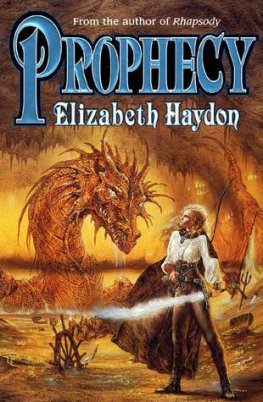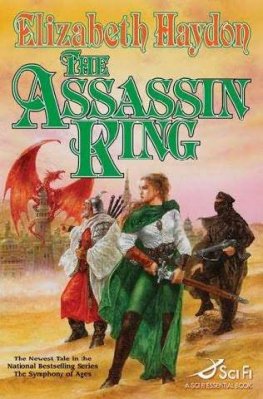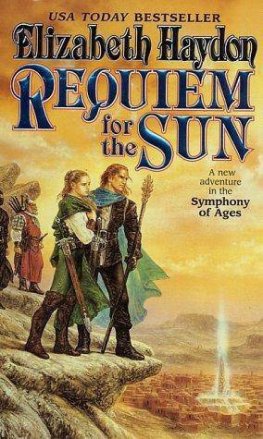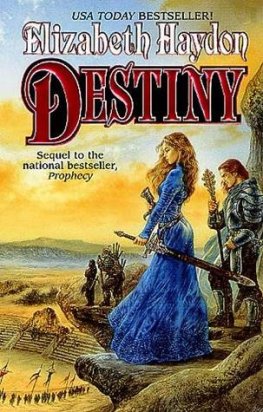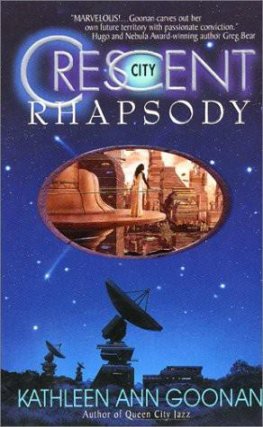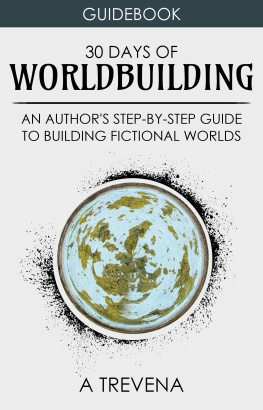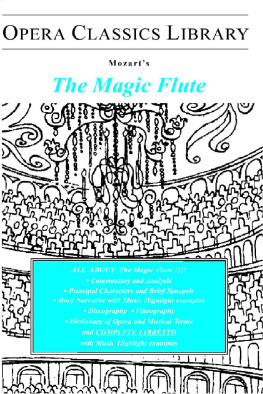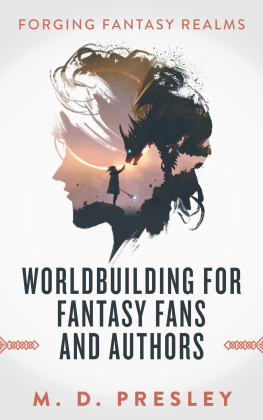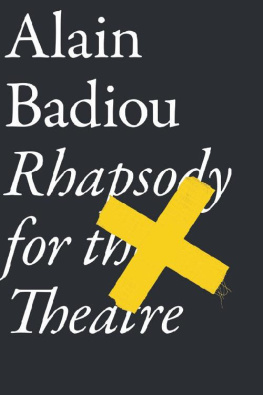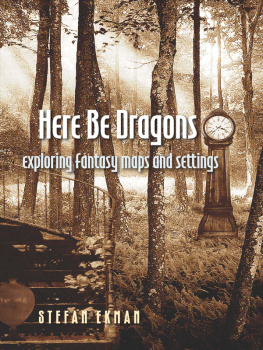Elizabeth Haydon
Rhapsody: Child of Blood
To November, October, and September
the three best months of the year
with love and appreciation
for all they have given me
The Prophecy of The Three
The Three shall come, leaving early, arriving late,
The life stages of all men:
Child of Blood,
Child of Earth,
Child of the Sky.
Each man, formed in blood and born in it,
Walks the Earth and sustained by it,
Reaching to the sky, and sheltered beneath it,
He ascends there only in his ending, becoming part of the stars.
Blood gives new beginning,
Earth gives sustenance,
The Sky gives dreams in lifeeternity in death.
Thus shall the Three be,
One to the other.
The Prophecy of The Uninvited Guest
Among the last to leave, among the first to come,
Seeking a new host, uninvited, in a new place.
The power gained being the first,
Was lost in being the last.
Hosts shall nurture it, unknowing,
Like the guest wreathed in smiles,
While secretly poisoning the larder.
Jealously guarded of its own power,
Neer has, nor ever shall its host bear or sire children,
Yet ever it seeks to procreate.
[...]He modified the miniature bristle. Finally satisfied, he meticulously dabbed the liquid onto the eyes of the boy in the now-frozen image and waited to see that the solution had spread across the sapphire-blue irises to the corners of each canthus. The window of opportunity would be small and final; it was important that the boy be given every chance to see things clearly and quickly. When he was done he recorked the phial and set it back on the gleaming disk.
Meridion removed the spool from the Time Editor and replaced it with a different one, another Past, even older. This he spun out with even more care, owing to its extreme age and the nature of the place from which it had come, now vanished beneath the waves. It took a great deal longer to find the right point on this thread, but Meridion was patient. It was important to do this correctly; much depended on it.
When he finally found the right place he stopped the frame again and picked up a different tool. With a practiced hand he made a smooth, circular slice, plucked the image from the first strand, and placed it gently into the second. He looked through the lens to check his work.
The boy had not lost consciousness, as he had expected, but instead lay writhing facedown on the ground with his head cradled in his hands, frantically rubbing his eyes. Meridion was both amused and sorry. I should have known he would fight it, he thought. He sat back and turned the viewing screen onto the wall to watch the outcome of his work and wait for the moment of meeting, and of exit.
1139 year. Third Age.
The pain subsided as quickly as it had come. Gwydion spat out the dust from the road and rolled onto his back, allowing himself a deep groan. He glanced at the sky above him and was instantly aware of the shift not only in location but in time of day. A moment ago it had been early morning, and now it was afternoon, winding toward evening. That he had been removed from where he had been was clear to him; he had no idea where he was.
Gwydion had been blessed with a pragmatic nature, and after a moment of adjusting to the new surroundings he stood and began calculating what to do next. How or why this had happened to him was not an issue for the moment.
The air of this place was thinner than the air of home, and Gwydion knew it would take some time for him to acclimate to it. Glancing around, he spied a small copse of trees a short jog away, and he hastily made for it.
Upon reaching the shelter he sank to the ground and began to inhale in short, shallow breaths, slowing and expanding each one until his lungs began to assimilate, shielding his watering eyes to give them a chance to adjust. Then he felt for the items he had brought with him on his way to town: his dagger and pouch were still there, as well as his waterskin and the apple. He took a quick drink. As he was capping the skin he felt faint vibrations in the ground below him. A cart, or something like it, must be approaching.
Gwydion sank lower to the ground as the ever-thickening dust cloud signaled the arrival of the group. He could see three men walking beside the cart, which was pulled by two oxen with a calf following along behind. It was laden with barrels of grain and loose straw, and a fourth man was driving it. The dress of the men was unfamiliar to him, although it was apparent that they were peasants, probably farmers.
Gwydion listened as carefully as he could over the rumbling din of the carts wheels. His eyes throbbed slightly and then were drawn to the farmers lips, strangely accentuated in the haze that filled his view. Suddenly his vision became intensely clear; it was if he could see the words as they were formed in the mens mouths, and could hear them as if they were being spoken directly into his ear. When he recognized the language pattern, his head began to spin.
They were speaking Old Cymrian. It isnt possible, he thought. Old Cymrian was essentially a dead language, used rarely in the holy-day ceremonies of religions other than his own, or as a vanity language among those of Cymrian lineage. But it was being spoken here, between peasants, as common vernacular on an average day in farmlands. It wasnt possible, unless... Gwydion shuddered. Serendair, the Cymrian homeland, had been gone for more than a thousand years now, vanished into the sea in the cataclysm that swallowed the Island and some of its neighbors in volcanic fire.
His ancestors had come from there, as had those of a few of his friends, but by and large the refugees of that land were a dispersed people, the casualties of wars they visited upon the lands of their hosts. Could there still be an untouched pocket of them here, wherever he was, living as they had thirteen centuries before?
As the cart and its accompanying dust cloud rumbled out of sight, Gwydions head emerged from the patch of trees and brush to watch it go. He saw it make a laborious climb up a graded hill to the west and disappear over the summit. He waited until he knew that he could reach the top of the hill with them in sight while remaining unseen, checked to be sure there was no one else on the road, and then made for the summit himself.
The countryside was hilly, and when he got to the top he paused a moment to take in the sight of the late-afternoon sun favoring certain pastures with blankets of gold. This rolling land was beautiful, and he knew he had never been through these parts before, or he would have remembered it. It was verdant in the heat of summer, the green earth filling the air with the rich scent of life.
The farmlands stretched out as far as he could see in an endless expanse of field and meadow dotted with trees but no real forests. There was no sign of any major waterway either, except for small streams that crossed the pastures, and the wind held no scent of the sea.
Gwydion had no time to wonder where he was; the light was beginning to leave the sky, and the cart was almost out of sight. Its destination was probably the small village he could see past the next valley. Between here and there were several small farms and one large one. He decided to stop at the first small farm and see if he might find lodging and, with any luck, answers.
Gwydion removed the gold crest ring from his hand and tucked it quickly into his pouch. He took one last look around the hilly vista, and drew in a deep breath. His lungs had gotten used to the air here; there was a sweetness to it, mixed with the scent of pastureland and barns, a richness that spoke of a happiness he had never known in his short life.
A sense of calm overtook him. There was no time to wonder how he had gotten here, and no need. Whatever the reason, he was here now, and he meant to make an adventure of it. He took off in a dead run for the farmhouse at the dip in the road, where candlelight was just beginning to shine in the windows.


